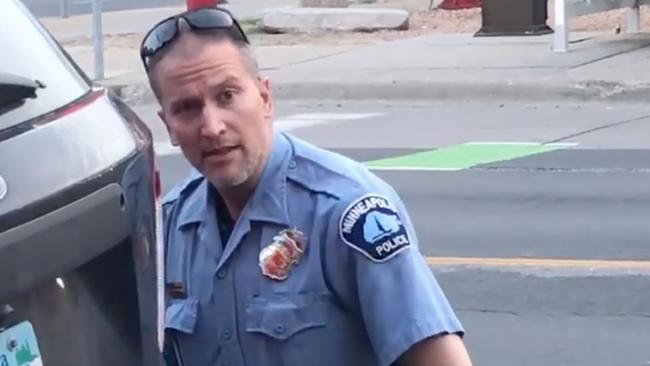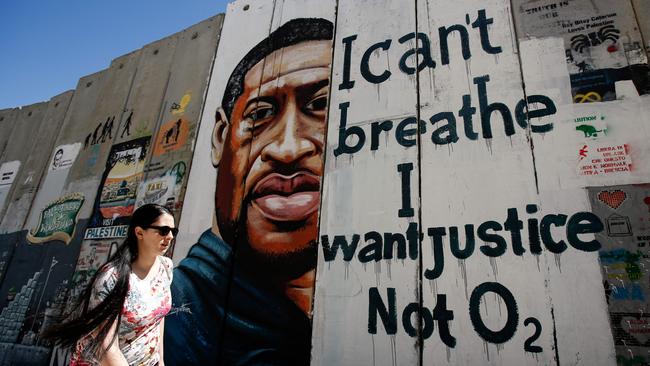George Floyd was killed by drugs, officer’s lawyer claims
George Floyd took a powerful opioid as he was being arrested, says lawyer acting for police accused of killing him.

George Floyd “contributed to his own death” by taking a powerful opioid as he was arrested and by refusing to obey police instructions, according to a lawyer for one of the four former officers accused of killing him.
Mr Floyd died during an arrest on May 25 in which Derek Chauvin knelt for more than nine minutes on his neck. Video of Mr Floyd lying face down on the tarmac saying he could not breathe spurred global protests against racism and police brutality.
Mr Chauvin was charged with murder and manslaughter. Thomas Lane and Alexander Keung, who helped hold Mr Floyd down, and Thomas Thao, who kept back bystanders who wanted to help Mr Floyd, were charged as Mr Chauvin’s accomplices.
Now a lawyer for Mr Lane has begun laying out their likely defence. “None of these guys, even Chauvin, actually killed him,” Earl Gray, a Minnesotan defence attorney, told the Los Angeles Times. “He killed himself.”
He pointed to a frame from video of Mr Floyd’s arrest. “Look closely at Mr Floyd’s mouth,” he wrote in a court filing this week. “There is a white spot on the left side of his tongue.” He wrote that Mr Floyd turned his head away for a moment and “the white spot is gone”.

Mr Gray pointed to an exhibit “illustrative of what 2 milligrams of fentanyl, a lethal dose, looks like” and then wrote: “The court may draw inferences from the facts.” He noted that a toxicology report confirmed the presence of fentanyl, methamphetamine and the active ingredient for marijuana in Mr Floyd’s blood. Separate coroners have differed on the causes of Mr Floyd’s death. Pathologists hired by Mr Floyd’s family concluded that he died of “mechanical asphyxiation”, finding that the knee on Mr Floyd’s neck interfered with his breathing and blood flow. However, a county medical examiner’s finding appeared less conclusive on that point, suggesting Mr Floyd died from a heart attack.
Prosecutors have conceded that Mr Floyd had heart disease and there was evidence in his blood of fentanyl and “recent methamphetamine use”. However, they said the coroner “opined that the effects of the officers’ restraint of Mr Floyd, his underlying health conditions and the presence of the drugs contributed to his death” and concluded “the manner of death was homicide”.
Mr Gray pointed to a finding that Mr Chauvin’s knee did not cause bruising to the neck. He said Mr Floyd had been arrested a year earlier, in May last year, by officers who found him “acting extremely nervous” and failing to listen to their commands. He had “put something in his mouth” as they attempted to arrest him and had to be physically removed from the vehicle, Mr Gray wrote.

He was said to have told hospital staff that he had injected opioids before he was arrested and that he had been struggling with an addiction to opiates for a year and a half.
The lawyer says allegations that Mr Floyd had possessed and used counterfeit currency could have resulted in a 20-year prison term, arguing that the officers “had an obligation to arrest Mr Floyd”. Mr Floyd resisted efforts to place him in the back of a police car, he writes. “While attempting to avoid his arrest, all by himself, Mr Floyd overdosed on fentanyl,” adding that his “level of intoxication” would have made breathing difficult. He told officers he could not breathe while they were attempting to place him in the police car.
Mr Floyd’s aunt, Angela Harrison, told the Minnesotan Star Tribune that her nephew’s past encounters with the police were irrelevant. “Nothing justifies the way he died,” she said.



To join the conversation, please log in. Don't have an account? Register
Join the conversation, you are commenting as Logout